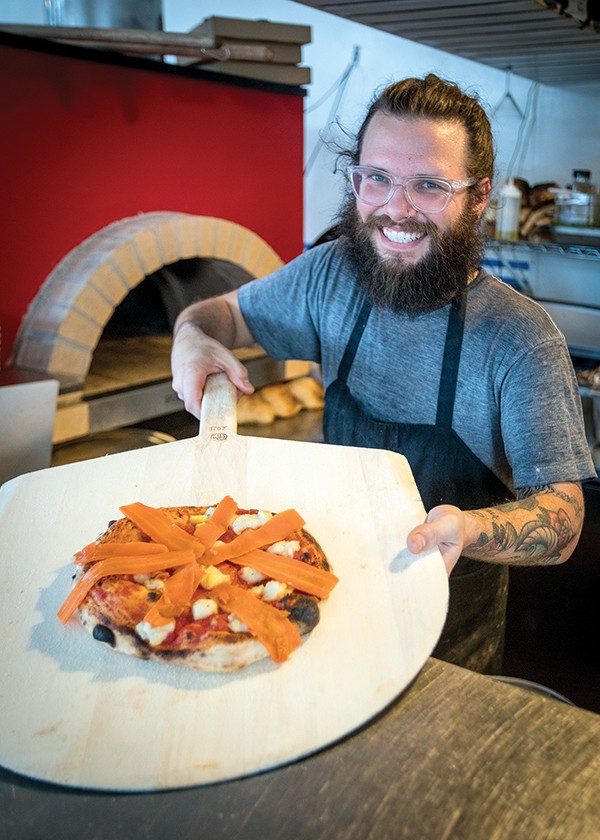Outside Fuel Cafe, on Madison in Midtown, hangs a banner declaring “Weird Pizza.”
According to Don Gaines, who’s the slice guy at Fuel, the idea was to be playful, to note that you won’t find your Neapolitan pizza here. “We’re making our own version of pizza,” says Gaines.
Their own versions include the Carrot Hawaiian, with carrot ham (a Gaines invention) and pineapple; and Shroom-sation, with mushroom cream, cremini, and oyster mushrooms.
Gaines says he got into pizza via baking bread. The sourdough bread he was making would be a pretty decent pizza crust, he thought. He perfected his crust and then he started inviting people over for Pizza Cult, where folk got to try his creations for free. Gaines, who is vegan, perfected a melty vegan mozzarella with cashew and brown rice culture. Toppings could get creative — miso-soaked potatoes, lemongrass tofu, squash strips, etc. He uses organic flour and a sourdough culture for his pizza crusts.
Gaines then reached out to Erik Proveaux, the owner of Fuel Cafe. He wanted to talk to Erik about opening his own restaurant. Proveaux discouraged him, telling him it was really hard. He suggested starting at the farmers market, which Gaines did.
The pair hooked back up again when Proveaux wanted to re-do Fuel’s menu. For devoted Fuel patrons, the menu is no longer recognizable. The very popular veggie burger is gone (though still available through the food trucks and frozen at the restaurant). The menu is now more vegan-friendly, though there is some fish and shellfish.

Don Gaines serving up a Carrot Hawaiian pizza at Fuel Cafe
Beyond the pizzas, there’s polenta with chunky veggie stew, walnut loaf over smashed potatoes, and wild-caught cod for entrees. Sides include the very tasty pan-fried smelt, which can be substituted for oyster mushrooms, an herb lentil salad, and the Caesar-esque salad with a creamy tahini dressing. Among the sandwiches are a Banh Mi, a black-eyed pea falafel, and roasted veggie.
But this is about the pizza. When pressed to define his style of pizzas — is it artisan? — Gaines says, “It’s real.”
Fuel Cafe, 1761 Madison 725-9025, fuelcafememphis.com
Dodo Pizza is a Russian-based pizza chain now in 11 countries with 330 locations. The first location in the United States was in Oxford, Mississippi, which opened in 2016. (They also serve pizza at the Ole Miss stadium.) The second area location is in Southaven. The third U.S.A. operation will be in Memphis at 6155 Poplar, set to open in May.
Andy Kirievskiy, the franchisee, says when the Oxford store opened, Dodo offered one size, with no customizations or phone orders. He quickly learned that would not fly in America. “We were hit pretty hard,” he says.
The Memphis store will offer three sizes and a build-your-own option. Among the pizzas on the menu are the Meats, with pepperoni, ham, Italian sausage, and bacon; Chicken BBQ; Spinach Feta; Chicken Club; and Veggie with a ricotta sauce.
The idea to expand into the U.S.A. came from the editor of Pizza Magazine Quarterly, which is based in Oxford. A writer for the magazine said Dodo founder Fedor Ovchinnikov “may just be the Steve Jobs of pizza.”
Kirievskiy says that Russia doesn’t have a pizza style, per se, like Chicago or New York. Instead, Dodo’s focus is on the best ingredients and business transparency. The restaurant’s financials are available online, and action in the kitchen is live-streamed. “Every customer can see how the kitchen works,” explains Kirievskiy.
One thing that Dodo had to figure out was what works in China and America, which they did.
“The things we do, we do well,” Kirievskiy says.